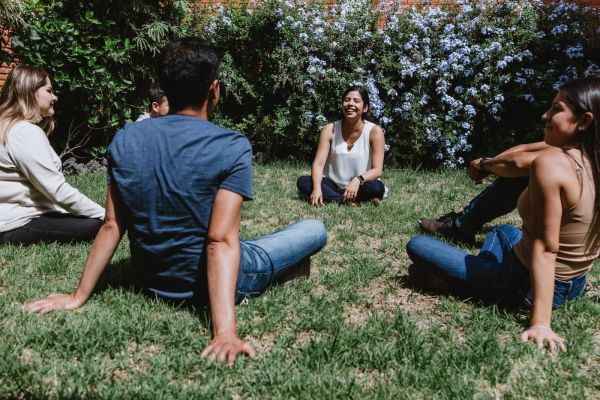We all know that saying, “C’s get degrees.” But what about if the C stands for cancer?
Homework, tests, and extracurricular activities are more than enough for any student to fit into their backpacks. On top of all that, putting cancer into the equation makes for an even more difficult problem than the confusing calculus homework you have due on Monday. Being a student with cancer is tough, but with some creative scheduling and learning to lean on others, you’ll earn a master’s degree in “keeping the balance.”
Think of my tips below as a cheat sheet to finding your balance between cancer and school.
Teacher’s Pet: Let Your Teachers Know
Telling your teachers what you’re going through is extremely important because it allows them to understand why you are missing classes, not participating as much, or aren’t doing as well. If they understand your situation, they most likely will be willing to give you extra time on assignments, not call on you if you aren’t feeling well, and keep a closer eye on you to make sure you are doing okay with the material. Checking in with teachers before and after school or during their office hours is a great way to get some extra help if you are feeling behind or lost.
In addition, connecting with a guidance counselor, school nurse or the health office on campus about your situation gives you an outlet when you need some space. There are going to be many times when you feel upset, fatigued, nauseated, or all of the above, so having a quiet space in school to shut your eyes for a few minutes or blow off some stressful steam is a great resource to lean on.
Passing Notes: Making Up Missed Time
You’re going to miss a lot of class time while being a cancer patient. Although you should be in contact with your teachers on what you missed, having a fellow student in each class take notes for you is a good way to keep up on the material. They can just snap a picture of their notes and email them to you to print out.
Joining a study group can help with figuring out assignments, completing homework or preparing for big exams. Or, get a private tutor to help you one-on-one if the workload gets too stressful and overwhelming. A lot of colleges have free tutoring centers on campus where students of that specific major help you understand the material. A private tutor is also great if you’re like me and you need quiet space and a lot of attention when learning.
Never miss another Cancer Talk blog!
Sign up to receive our monthly Cancer Talk e-newsletter.
Sign up!Social Studies: Managing Friends and Extracurriculars
Your friends are going to want to be supportive, but they might not know what to do or how much is too much. It’s hard to tell your friends you need space, but there is going to be a lot of days where you just want to rest. Telling your friends what you need and educating them on what you’re going through is extremely important. You might need to remind them that you’re still you and don’t need to be treated differently. Just remember they will understand and want to be there in whatever way you need — but they won’t know what you need unless you tell them. A lot of the time I felt overwhelmed with people reaching out to me (even though I know they were just trying to be helpful). If you have one closer friend, consider making them a “team captain” who can tell others at school what you need, how you’re doing, or how they can be helpful.
The social life that comes along with school can be a challenge. You might start to feel left out scrolling through social media on the couch while your friends are out having fun. If you aren’t feeling up to social activities, consider having friends over. If you can’t go to the party, find some ways to bring the party to you like inviting friends over for a movie, game night or even to hang out during a treatment. Roswell Park has a Young Adult Program where you can connect with other young adults in the area who have, or are currently going through, cancer treatment. The program stages events throughout the year, like concerts, escape room challenges, and sporting events to hang out with other patients, survivors and their friends.
When Was That Due?: Managing Your Time
It’s difficult to stay on track with all of your appointments as a patient. Having a planner is a useful tool because it gives you an overlook of what your upcoming week and month looks like. This is a good way to keep balance and not get overwhelmed by planning too many things at the same time. Seeing when your treatments and appointments are, along with what tests or assignments you have due, is a great way to figure out how you have to prepare and manage your time that week. When I was going through chemo it took a full week for me to feel better, so seeing that week blocked off in my planner, I knew not to plan too much.
Packing Your Lunch: Stuff to Help You Stay Comfortable
Be sure to pack several different options for your lunches and snacks. This way you’ll have something — sweet, salty or bland — for however you may feel that day.
I recommend a couple things to pack in your backpack that can bring comfort. I used ginger chews called Chimes to help settle my stomach when I felt nauseated. Ginger tends to help with nausea so having something on hand at school can help ease that sensation. Pack a mask and hand sanitizer to pop on when you’re around someone with a cough or sneeze. Schools are filled with germs and when you are going through treatments, your immune system is really weak, and you are at high risk for infection.
Cutting Class: Taking Time Off
A lot of cancer patients take time off from school when they are going through treatments. Over my time with cancer, I made a pen pal with a girl named Amelia who is now entering her senior year of college. Amelia took her junior year off after being diagnosed with Hodgkin lymphoma mid-way through the previous semester. She found this was the best decision for her because she wasn’t “half-in” with her schoolwork or health. Instead, she was able to focus fully on her health and getting better, and then fully concentrate on her schoolwork and activities.
Whatever you decide to do with your academic plan, attending school full time, part time — or taking time off — it’s your decision. Do what’s best for you and know that you have your friends, family and hospital resources to help you along the way. It’s good to be busy with school but your health is most important. No matter what, allow yourself time, aim for balance, and lean on others and you will achieve your goals!



